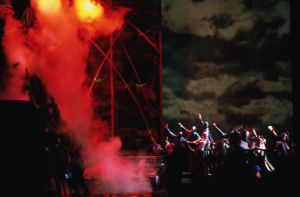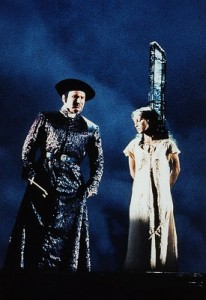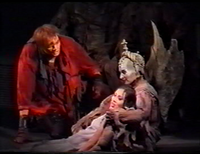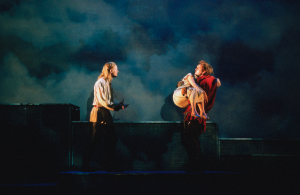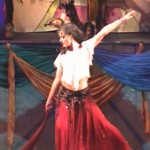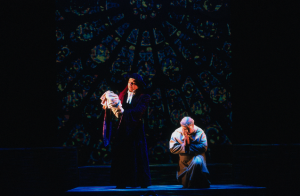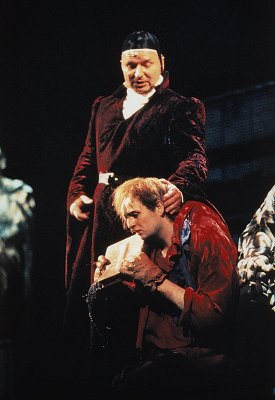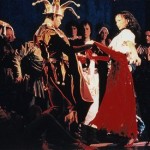This is the Ninth Part (or the last part) of my review on the music of Der Glöckner von Notre Dame
Grand Finale or Ultimo Finale is the ending and occurs in two parts. The Finale is where the two most famous differences occurs; The death of Frollo by Quasimodo and the death of Esmeralda. Apparently the translator Michael Kunze campaigned to have Esmeralda die which makes it more like the book, though her death is by a different method. Kunze’s reasoning for this is that Esmeralda’s death would be viewed by European audiences as moving and more romantic of an ending. We’ll see how the American Broadway version handles this, though I kind of hope they keep the German ending.
The Final starts with Frollo pronouncing Esmeralda’s sentence then it goes into “song” portion. I use the word song in quotes because the Finale is a melody piece as it uses songs from throughout the show with one exception. So it starts pretty much the same as the movie with Sanctuary playing complete with latin lyrics as Esmerlada starts being burned and Quasimodo saves her and proclaiming sanctuary. Then Phoebus starts railing the people of Paris with the tune of Einmal (Once). Then the scene shifts back to Quasimodo who is defending Notre Dame from Frollo and his minions as he sings the tune of Wie aus Stein (Made of Stone).
After he pours the led from Notre Dame Quasimodo checks in on Esmeralda who is dying. My guess is she dying of asphyxia which is a condition of severely deficient supply of oxygen in body that arises from being unable to breathe normally. In her case this occurred from the fire. Anyway Quasimodo and Esmeralda have little conversation while Draußen (Outside) is played in the background. Esmeralda thanks Quasimodo for being her friend and then sings Hoch über der Welt (High above the World) and then the conversation continues for a couple more lines and then she dies. After she dies Frollo comes in and sings about how he happy to be free of her to the tune of Esmeralda but he sings this in a creepy, off balanced way. Quasimodo gets mad and the song shifts to a new melody with gargoyle singing with the latin choir. The gargoyle basically sing that God strikes the wicked, so the gargoyles, or aspects of Quasimodo’s own mind are telling him that he should kill Frollo, which he does by throwing Frollo off of Notre Dame, like in the book. I will point out that Quasimodo in the book does this in a fit of rage and here it’s a little more pre-mediated. After this the gargoyles sing Zuflucht (Refuge) about how the world is both cruel and kind. Quasimodo then sings Draußen (Outside) and sings about how he must live out there with all the pain, sorrow and fear that world can bring. He the carries Esmeralda outside and is joined by Phoebus. The ensemble then sing Einmal with as Quasimodo disappears. Then Clopin in his narrator role sings Die Glocken Notre Dames (The Bells of Notre Dame) and it’s pretty akin to the reprise at the end of the movie.
It’s vague what happens to Quasimodo but given how he sings about living it is doubtful that Quasimodo goes off to die. Also considering the two deaths this pretty much same except for Quasimodo and Esmeralda epic running away scene, that’s not there either.
So both Musically and plot wise we have a lot going on. However it’s a fitting ending. All the songs used here fit well together so while it could have felt a bit all over the place the emotional intensity flows well from one into the next. So if you like all these song before you’ll like them here.
Next time – A conclusion of the music

